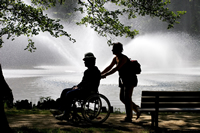Changes in Relationships

A stroke is a life changing event. Your loved one may not be the same person as before. This could affect relationships with family and friends.
What Do You Need to Know? 
The changes in your loved one will affect the entire family. Tasks they once did may no longer be possible. You and other family members may be faced with new responsibilities. These could include housework, yard work or managing money.
Some family members may not be able or willing to help. This is often difficult to accept. Some people have a harder time than others dealing with illness. Some may be overwhelmed with taking on new tasks. Try to forgive those who cannot help. With time, they may come around. Seek help from other family members and friends. Talk to your healthcare team about other resources in your area.
How Do Roles Change After Stroke?
A person’s “role” or place in the family helps define who they are. For example, a person’s role could be that of parent or spouse. When a stroke happens, roles may no longer fit.
Spouse
Being the spouse or partner of a stroke survivor brings special hardships. The person who once was an equal partner may now rely heavily on you. You may begin to feel more like a parent than a husband or wife. Feelings of loneliness are common. Problems with sexual intimacy and financial concerns can also strain the relationship. Learn more about sex after stroke and how to manage your loved one's finances.
Parent and Child 
An adult child caring for a parent brings its own challenges. It may seem that you are caring for or “parenting” your parent. The role reversal can be hard for both you and your loved one. Helping with personal care needs like bathing can cause anxiety and embarrassment. Another challenge can be learning how to balance caregiving with your own family responsibilities. However, keep in mind that caring for a parent can be one of the best experiences of your life. You’ll have the chance to grow closer and learn about one another.
- Remember that your loved one is facing a lot of changes – Try to understand how hard it is for him or her to accept your care.
- Realize that your loved one will always be your parent – It is important to treat your loved one as an adult. Be respectful.
- Let your loved one make as many choices as possible – Ask for your loved one’s advice. Treat your loved one as an equal.
- Be direct and firm if your loved one’s health or safety is an issue – Accept that you will make mistakes. Remember that the most important thing is to give love.-
What Is Your Loved One's New Role in the Family?
Your loved one may be different physically, mentally and emotionally. A lot may have changed. What has not changed is that your loved one is still part of the family. Even if your loved one cannot fulfill past roles, he or she can still contribute.
- Find new roles and things that your loved one can do – This will boost confidence.
- Encourage your loved one to do as much as possible – Help when you need to. But, avoid being too protective.
- Be patient – The stroke can make it hard to do simple tasks.
- Help your loved one relearn skills in small steps – Start with easy tasks. Slowly, add new skills.
- Have a daily routine – Allow short, frequent times in the day to practice skills.
How Can Stroke Change Personality?
Your loved one’s personality may be different after a stroke. Strokes sometimes damage the area of the brain that affects thoughts and emotions. Stroke survivors are often demanding and self-centered. They may be sad and withdrawn. They may have bursts of crying. At other times, they may laugh for no reason.
Remember that the changes in your loved one are due to the stroke. Your loved one has no control over these behaviors. Keep in mind that these difficult behaviors often disappear over time. Accept that these personality changes affect how you feel towards your loved one. Talking to others or your healthcare team may help. Learn more about coping with emotional changes after stroke and dealing with difficult behaviors.
How Can Stroke Change Communication?
Your loved one may have trouble listening, speaking and understanding words. These communication problems affect relationships with family and friends. Get help from a speech therapist. Continue to talk with your loved one. Make your loved one feel part of the family. Learn tips for communicating with stroke survivors. Learn more about speech and communication problems.
What Is the Effect on Family Relationships? 
The stress of caregiving can strain family relationships. Family members may need to sacrifice time and money to help with care. This can lead to feelings of anger and resentment. Arguments over care and money can cause misunderstandings and hurt feelings.
Helpful Tips to Improve Family Relationships
Hold family meetings – Come together to discuss concerns. Be open and honest about your feelings. Allow others to do the same.
Show appreciation – Caregiving can be a thankless job at times. Be sure to tell each other thank you. Everyone deserves to feel appreciated.
Work together – Include family members in decision making. They will be more likely to want to be involved in care.
What Is the Effect on Relationships with Friends?
Stroke recovery is a long and often slow process. After the crisis stage is over, people return to their own lives. Friends may not call or come by as often. Some may assume that you don’t need to be bothered. Others may be afraid of how to interact with the stroke survivor.
Caregiving can be a lonely job. It is hard for anyone who is not going through it to understand. Friends may want to help but may not know how. Reach out to your friends. Tell your friends specific ways they can help. If your friends shy away, find others who can support you. Start by finding a support group for caregivers in your area.
Remember
- Hold family meetings to discuss concerns. Be open and honest about your feelings. Allow others to do the same.
- Find new roles and tasks for your loved one. This will boost confidence and help him or her regain some independence.
- Reach out to family, friends and others in the community. Talk to them about your specific needs.
Other Resources 
Additional credible resources on this topic can be found here. Website pages may change or update, therefore if a link does not work, you may also try to type the information into your internet search bar. This Resource List will be updated frequently.
|
*Link Disclaimer: Links to information and Web sites outside of the Department of Veterans Affairs do not indicate an endorsement of products or services offered by the sites. In addition, these sites may have privacy and security policies that are inconsistent with those of VA. |
References: Eldercare. (2008). Coping with Chronic Illness. Retrieved November 21, 2008, from: http://www.eldercareadvocates.com/pages/art22.htm (This resource is no longer available.); The Stroke Association. (2006). Stroke: A carer’s guide. Retrieved November 24, 2008, from: https://www.stroke.org.uk/resources/carers-guide-stroke*; American Stroke Association. (2008). Retrieved November 24, 2008, from: http://www.strokeassociation.org/presenter.jhtml?identifier=3042602*; Family Caregiver Alliance. (2008). Caregiving and sibling relationships: challenges and opportunities. Retrieved December 2, 2008, from: http://www.caregiver.org/caregiver/jsp/content_node.jsp?nodeid=868*. Mace, Nancy L. and Peter V. Rabins. (1981). The 36-Hour Day. New York: Warner Books.
These materials were created for the project:
Web-Based Informational Materials for Caregivers of Veterans Post-Stroke
Project Number SDP 06-327 funded by VA HSR&D Quality Enhancement Research Initiative (QUERI)



















